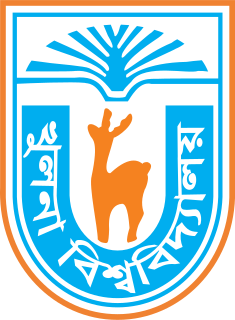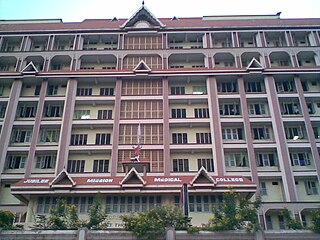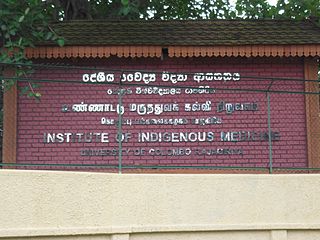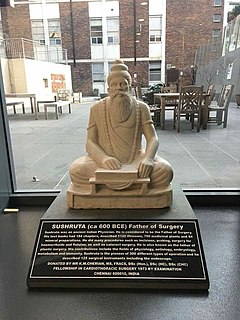
Ayurveda is an alternative medicine system with historical roots in the Indian subcontinent. The theory and practice of Ayurveda is pseudoscientific. The Indian Medical Association describes Ayurvedic practitioners who claim to practice medicine as quacks. Ayurveda is heavily practiced in India and Nepal, where around 80% of the population report using it.
Degree abbreviations are used as an alternative way to specify an academic degree instead of spelling out the title in full, such as in reference books such as Who's Who and on business cards. Many degree titles have more than one possible abbreviation, with the abbreviation used varying between different universities. In the UK it is normal not to punctuate abbreviations for degrees with full stops, although this is done at some universities.

Doctor of Medicine is a medical degree, the meaning of which varies between different jurisdictions. In the United States, and some other countries, the M.D. denotes a professional graduate degree. This generally arose because many in 18th-century medical professions trained in Scotland, which used the M.D. degree nomenclature. In England, however, Bachelor of Medicine, Bachelor of Surgery was used and eventually in the 19th century became the standard in Scotland too. Thus, in the United Kingdom, Ireland and other countries, the M.D. is a research doctorate, higher doctorate, honorary doctorate or applied clinical degree restricted to those who already hold a professional degree (Bachelor's/Master's/Doctoral) in medicine; in those countries, the equivalent professional to the North American and some others use of M.D. is still typically titled Bachelor of Medicine, Bachelor of Surgery (M.B.B.S.).
Bachelor of Medicine, Bachelor of Surgery, is the primary medical degree awarded by medical schools in countries that follow the tradition of the United Kingdom. The historical degree nomenclature states that they are two separate undergraduate degrees. In practice, however, they are usually combined as one and conferred together, and may also be awarded at graduate-level medical schools.
A medical degree is a professional degree admitted to those who have passed coursework in the fields of medicine and/or surgery from an accredited medical school. Obtaining a degree in medicine allows for the recipient to continue on into specialty training with the end goal of securing a license to practice within their respective jurisdiction. Medical graduates may also pursue non-clinical careers including those in basic research and positions within the healthcare industry. A worldwide study conducted in 2011 indicated on average: 64 university exams, 130 series exams, and 174 assignments are completed over the course of 5.5 years. As a baseline, students need greater than an 85% in prerequisite courses to enroll for the aptitude test in these degree programs.

Khulna University is a public university in Bangladesh. It is situated at Gollamari, Khulna, Bangladesh, by the river Moyur, beside the Khulna-Satkhira highway. The academic programs of Khulna University started on 31 August 1991 with 80 students in four disciplines. As of November 2019, the university has 29 disciplines under six schools and two institutes. It is the only public university in Bangladesh where student politics is not allowed.
A terminal degree is a university degree that can signify one of two outcomes. In some cases, it is the highest degree that can be awarded in a specific academic or professional track. In other cases, it is a degree that is awarded when a candidate completes a certain amount of coursework but does not go on to doctoral work. Some students enroll in a terminal Master's program with the goal of preparing to enter a PhD program. For certain professions and research grants, a terminal degree is a minimum eligibility requirement.
Aberdeen University School of Medicine, Medical Sciences & Nutrition contains the Medical School and Dental School at the University of Aberdeen in Scotland. It also provides training and carries out research in medical sciences, nutrition, public health, dentistry, health sciences, physician associate studies at BSc, MSc, and PhD levels. The current school was formed from the merger of the former School of Medicine & Dentistry, School of Medical Sciences, and the Rowett Institute of Nutrition.

Siddha medicine is a traditional medicine originating in South India. It is one of the oldest systems of medicine in India.

Postgraduate Institute of Medical Education and Research (PGIMER) is a public medical university in Chandigarh, India. It is an 'Institute of National Importance', INI. It has educational, medical research, and training facilities for its students including all specialties, super specialties and sub specialties. It is the leading tertiary care hospital of the region and caters to patients from all over Punjab, J&K, Himachal Pradesh, Uttarakhand and Haryana. Apart from the clinical services, PGI also provides training in almost all disciplines of Medicine including post graduate and post doctoral degrees, diploma and fellowships. There are more than 50 such training courses in the institute. Since it is a post graduate institute, it does not have facilities for undergraduate MBBS courses. It is ranked 2nd among medical universities in India in 2021 by the National Institutional Ranking Framework.

Sokoine University of Agriculture (SUA) is a public university in Morogoro, Tanzania, specializing in agriculture. The university is named after the country's second prime minister Edward Sokoine.
The Ministry of Ayurveda, Yoga, Naturopathy, Unani, Siddha, Sowa-Rigpa and Homoeopathy is purposed with developing education, research and propagation of indigenous alternative medicine systems in India. As per a recent notification published in the Gazette of India on 13 April 2021, the Ministry of AYUSH, will now be known as the Ministry of Ayush. The Ministry of Ayush includes the seven traditional systems of healthcare.

National Institute of Homeopathy (NIH) is an autonomous organisation under the Ministry of Ayurveda, Yoga & Naturopathy, Unani, Siddha and Homeopathy (AYUSH), Government of India. It conducts the BHMS, MD (Homeopathy) and PhD (Homeopathy) courses in Homeopathy. The Institute has a 250-bed hospital, with 10 for surgery and 10 for maternity cases.

Muhimbili University of Health and Allied Sciences (MUHAS) is a public university in Dar es Salaam, Tanzania. It is accredited by the Tanzania Commission for Universities (TCU).

Jubilee Mission Medical College and Research Institute is a private, non-profit Christian minority medical college, hospital and research institute located at Thrissur in Kerala, India. The establishment is administered by the Jubilee Mission Hospital Trust, a charitable organisation under the Catholic Archdiocese of Thrissur.

Academic dress of Imperial College London describes the robes, gowns, and hoods worn by graduates and associates of Imperial College London. After gaining its independence from the University of London in 2007, graduates began wearing Imperial academic dress in 2008. The unifying colour for Imperial's academic dress is purple after the work by William Henry Perkin.

The Institute of Indigenous Medicine (IIM) is an affiliated institute of the University of Colombo, specialising in Ayurveda and the Sri Lankan traditional medicine. Founded as the College of Indigenous Medicine in 1929, it became part of the University of Colombo adopting its current name in 1977. It is a premier center of undergraduate and postgraduate study and research into Ayurveda and Indigenous Medicine and Healthcare.

Kent Business School, also known as KBS, is the business school of the University of Kent. Since opening in 1988, it offers undergraduate, postgraduate, PhD degree programmes and The Kent MBA.
Vaidya Balendu Prakash is an Indian Ayurveda practitioner. He is a former physician to the President of India and the founder of Paadav, a specialty Ayurvedic hospital in Dehradun. The Government of India awarded him the fourth highest civilian award of the Padma Shri in 1999.

The standard entry-to-practice degree in modern medicine in India is the Bachelor of Medicine and Bachelor of Surgery (MBBS), Among Modern Medicine, Alternative System of Medicine in India Such as Ayurveda (BAMS), Unani (BUMS), Siddha(BSMS), Homeopathy (BHMS). MBBS a credential earned upon completion of a five-and-a-half-year undergraduate program. The curriculum is divided into one year of preclinical studies in general science subjects and three and a half years of paraclinical and clinical studies, followed by a one-year clinical internship. Before beginning the internship, students are required to pass several examinations, the final one of which is conducted in two parts. Graduate education in medical specialties typically takes three additional years of study after the MBBS and concludes with the award of the Master of Surgery or Doctor of Medicine(MD). Postgraduate diplomas in medical specializations may also be awarded upon the completion of two-year training programs.












